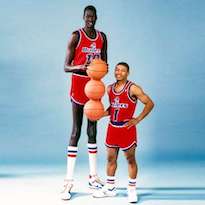 Cristina kicks off the show with a basketball related myth in honour of her beloved Toronto Raptors; did NBA legend Manute Bol really coin the phrase ‘My Bad’? As the only TRC co-host who is not married, Darren scrutinizes an article citing research that suggests unmarried people are happier, probably just to rub it in. Finally, Adam vents his Fornite pet peeve that the game just doesn’t get the Doppler Effect.
Cristina kicks off the show with a basketball related myth in honour of her beloved Toronto Raptors; did NBA legend Manute Bol really coin the phrase ‘My Bad’? As the only TRC co-host who is not married, Darren scrutinizes an article citing research that suggests unmarried people are happier, probably just to rub it in. Finally, Adam vents his Fornite pet peeve that the game just doesn’t get the Doppler Effect.
Download direct: mp3 file
Did NBA’er Manute Bol Coin ‘My Bad’?
Boing Boing: Manute Bol’s Legacy
Deadspin: Did Manute Bol coin the phrase my bad
Washington Post: Manute Bol and my bad
Unmarried People Happier?
Institute for Family Studies – Nicholas Wolfinger
Fortnite Vs The Doppler Effect
What Is The Doppler Effect? – 5 Minutes with an Astronomer
Fortnite Vinder Bus (Fortnite Battle Royale) – Gaming Sound Effect (HD) | Sound Effects– YouTube








Hi folks, this is undoubtedly not something to bother correcting on the show but I thought I’d do my duty as an instructor of freshman composition and a sometimes-linguist on a couple points of pronunciation in TRC 550. (Unless you were speaking Ontarioan).
1) “Longitude” — usually pronounced with a sound, like LON-ji-tude, not long-ih-tude.
2) “Jibe/jive” — when something doesn’t agree with something else, it is said that it doesn’t “jibe with” the other thing (not “jive with.”) (see Merriam-Webster ‘jibe’)
And from Grammarist: Gibe, jibe, jive
refers to a taunt or a derisive remark. It functions as both a verb (to taunt) and a noun (taunt). has a nautical use (relating to turning the sail to go on an opposite tack), but it’s most often used to mean agree or to be in accord.
refers to either jazz music, dancing, or nonsense talk, although it can sound old-fashioned or ironic in its senses unrelated to dance.
M-W goes on to say:
People began confusing ‘jive’ and ‘jibe’almost immediately after ‘jive’ entered our language in the late 1920s. In particular, jive is often used as a variant for the sense of jibe meaning “agree,” as in “that doesn’t jive with my memory of what happened.” This use of jive, although increasingly common, is widely considered to be an error. Jibe, however, is accepted as a variant spelling of an entirely different word, which is gibe (“to utter taunting words”).
Regards,
Long time listener
Jim VEE-deffer
[looks like my bold-face typography got dropped out, so here it is again]
Hi folks, this is undoubtedly not something to bother correcting on the show but I thought I’d do my duty as an instructor of freshman composition and a sometimes-linguist on a couple points of pronunciation in TRC 550. (Unless you were speaking Ontarioan).
1) “Longitude” — usually pronounced with a sound, like LON-ji-tude, not long-ih-tude.
2) “Jibe/jive” — when something doesn’t agree with something else, it is said that it doesn’t “jibe with” the other thing (not “jive with.”) (see Merriam-Webster ‘jibe’)
And from Grammarist: Gibe, jibe, jive
‘Gibe’ refers to a taunt or a derisive remark. It functions as both a verb (to taunt) and a noun (taunt). ‘Jibe’ has a nautical use (relating to turning the sail to go on an opposite tack), but it’s most often used to mean agree or to be in accord.
‘Jive’ refers to either jazz music, dancing, or nonsense talk, although it can sound old-fashioned or ironic in its senses unrelated to dance.
M-W goes on to say:
People began confusing ‘jive’ and ‘jibe’almost immediately after ‘jive’ entered our language in the late 1920s. In particular, jive is often used as a variant for the sense of jibe meaning “agree,” as in “that doesn’t jive with my memory of what happened.” This use of jive, although increasingly common, is widely considered to be an error. Jibe, however, is accepted as a variant spelling of an entirely different word, which is gibe (“to utter taunting words”).
One look at the episode title and I knew which TRCer was doing which segment. Basketball, happiness, and pop culture? Christina, Darren, and Adam. Not that I have you all pigeonholed, or anything
Good episode, you all!